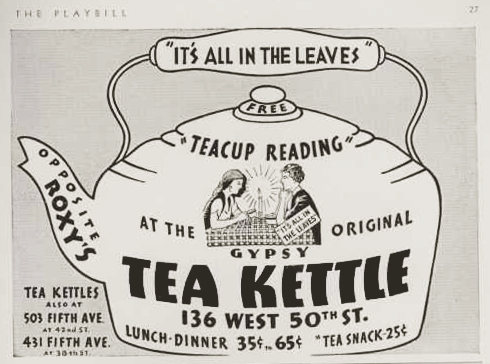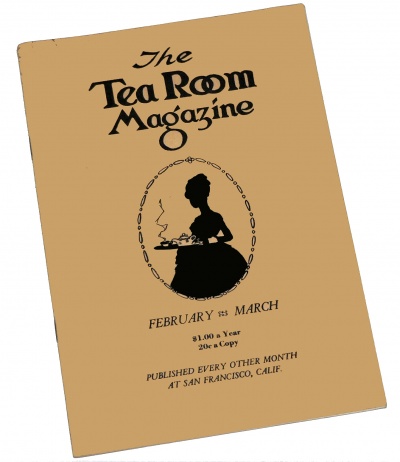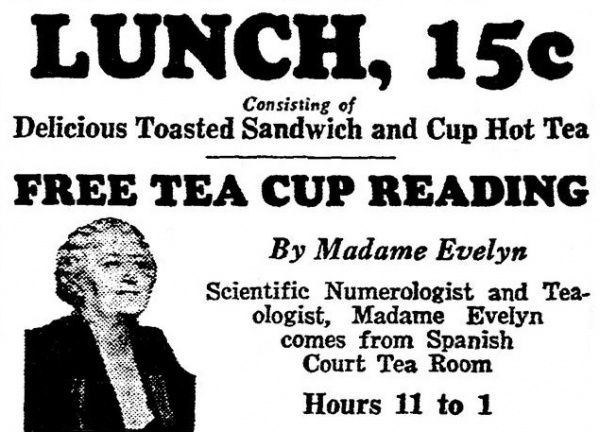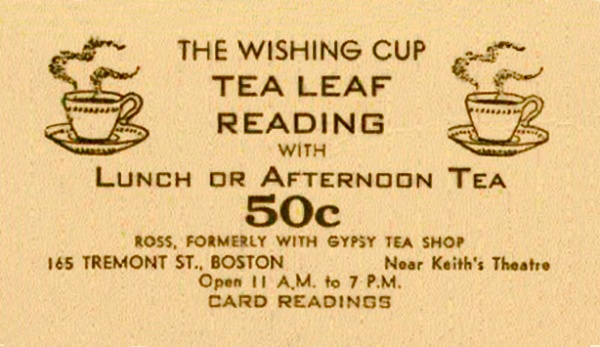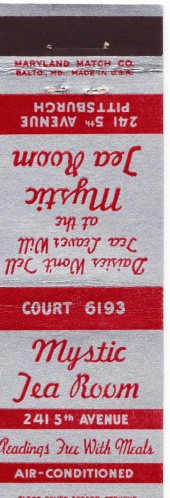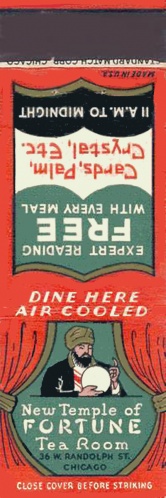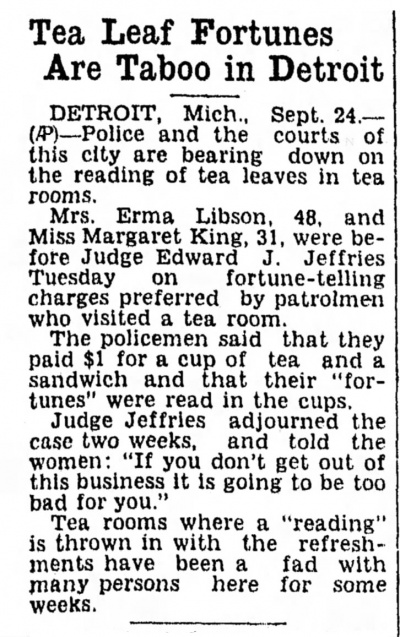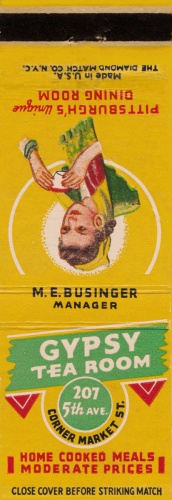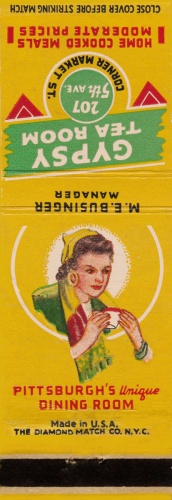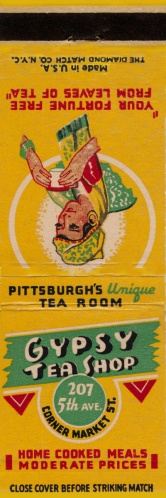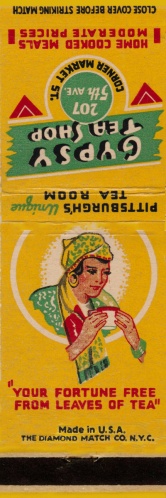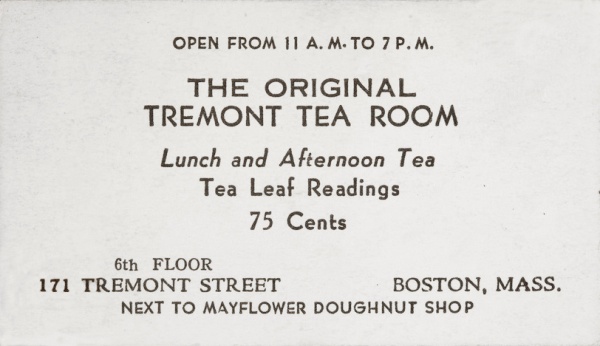Having Your Fortune Told At a Tea Room
From Mystic Tea Room
(edit and save) |
(edit and save) |
||
| Line 40: | Line 40: | ||
== The Law Cracks Down== | == The Law Cracks Down== | ||
| - | + | When the Great Depression laid the United States economy low in 1929, restaurants and theaters, always a luxury, were hard-hit. To lure folks in, they devised a variety of giveaways. Movie houses held "dish night" promotions in which a carnival wheel was spun on stage and lucky ticket holders received free kitchenware. Tea rooms in the countryside added gift shops and antiques stores to bolster income, and those in the cities began offering free tea leaf readings. | |
| - | + | Slogans like "It's All In the Leaves," "Your Fortune Free in Leaves of Tea," and "Free Reading With Every Meal" were promoted on business cards, [[Vintage Tea Room Matchbook Covers|matchbook covers]]. and xxx | |
| + | |||
| + | [[File:Tea-Leaf-Fortunes-Are-Taboo-in-Detroit-Ludington-Daily-News-Michigan-24-Sep-1930.jpg|thumb|400px|center|Tea Leaf Fortunes Are Taboo in Detriot, Ludington Daily News, September 24, 1930, Ludington, Michigan; newspaper clipping courtesy of Dixie M. Ford]] | ||
Muriel was from Detroit -- booklet cover scan (and also add the scan to the Bibliography) | Muriel was from Detroit -- booklet cover scan (and also add the scan to the Bibliography) | ||
Revision as of 01:44, 21 July 2021
In the past, and at a few places at the present time, a sitter could get free tea leaf readings from the waitresses at a "Gypsy" themed tea room, cafe, or restaurant. The best known of these places was, of course, The Mystic Tea Room, Bernice Barton's Pittsburgh restaurant after which this site was named. Other well-known tea leaf reading eateries were The Gypsy Tea Kettle, The Gypsy Tea Shop, The Gypsy Tea Room, The New Temple of Fortune Tea Room, The Egyptian Tea Room, The Spanish Court Tea Room, the Wishing Cup Tea Room, and The Original Tremont Tea Room.
But how did these Tea Leaf Reading Tea Rooms come about -- and where have they gone?
Contents |
Restaurants and the Female Suffrage Moment
As restaurant dining became more common in the mid to late 19th century, growing right beside it were the intertwined women’s movements that led to the establishment of public education, divorce laws that permitted women to escape abusive marriages, inheritance laws that allowed women to own and manage businesses, and the long, hard fight for female suffrage.
(Read More about Tea Room History)
Themed Tea Rooms
Tea Rooms were among the first "theme" restaurants.
These primarily woman-run establishments proliferated beyond the borders of the United States, too. There were rural tea rooms everywhere, from Canada to New Zealand, as well as in the British Isles. Wherever women sought independent incomes by catering to women motorists, tea rooms sprang up to meet the need.
(Read more about Locations of Vintage Tea Rooms)
Tea Leaf Reading as a Tea Room Theme
In urban America, where immigrants struggled to earn a living, the Eastern European themed tea room movement took a very quirky turn. At the Gift Shop Tea Room in New York you could buy the antique dinnerware on which you were served. There was a Russian Tea Room and a Russian Bear Tea Room, a Gypsy Tea Shop, a Gypsy Tea Room, and several Gypsy Tea Kettle Tea Rooms. When times got hard during the Great Depression of the 1930s, the owners of these small tea rooms took to luring in female diners by reading tea leaves, palms, and crystal balls— “Free With Every Meal!”
Read more about how tea rooms advertise via Vintage Tea Room Business Cards and Vintage Tea Room Matchbook Covers
The Law Cracks Down
When the Great Depression laid the United States economy low in 1929, restaurants and theaters, always a luxury, were hard-hit. To lure folks in, they devised a variety of giveaways. Movie houses held "dish night" promotions in which a carnival wheel was spun on stage and lucky ticket holders received free kitchenware. Tea rooms in the countryside added gift shops and antiques stores to bolster income, and those in the cities began offering free tea leaf readings.
Slogans like "It's All In the Leaves," "Your Fortune Free in Leaves of Tea," and "Free Reading With Every Meal" were promoted on business cards, matchbook covers. and xxx
Muriel was from Detroit -- booklet cover scan (and also add the scan to the Bibliography)
The Leatherneck Tea leaf Reader
Let's take a deeper dive into one themed tea room, where free readings were offered: The Gypsy Tea Room, also known as the Gypsy Tea Shop, at 207 Fifth Avenue, Pittsburgh, Pennsylvania, under the management of M. E. Businger.
So ... who was M.E. Businger, and what else was he doing at the Tea Room? Thanks to newspaper digitization resources, we have some answers. I have transcribed these articles from OCR records:
The Pittsburgh Press, Pittsburgh, Pennsylvania
Sunday, October 17, 1943; page 52
MARINE GROUP ENDORSES PROTHONOTARY FRASHER
In a resolution made public yesterday, the Leathernecks, an organization of Marine Corps veterans, announced the endorsement of Prothonotary William H. Frasher, Republican candidate for re-election. The resolution, signed by M. E. Businger and others, said Mr. Frasher has had 16 years' experience in the office while his opponent. David B. Roberts, Democrat. lacked the experience necessary for the office.
The Pittsburgh Press, Pittsburgh, Pennsylvania
Sunday, March 10, 1946; page 24
MARINE CORPS LEAGUE
National organization with two Pittsburgh posts.
Officers:
Commandant, Pittsburgh Detachment, William P. Coyne;
commandant. Leatherneck Detachment, Clem Templeton.
Dues:
$3 a year.
Meetings:
Pittsburgh, second and fourth Tuesday each month at 207 Fifth Ave.;
Leatherneck, second and fourth Tuesday each month at Fort Pitt Hotel.
Who Can Join:
Marine veterans of any war and men still in Marine service.
Information:
Pittsburgh Detachment, call M. E. Businger, 207 Fifth Ave.;
Leatherneck Detachment, call Paul Drew, 205 Clark Bldg.
The Pittsburgh Press, Pittsburgh, Pennsylvania
Friday, March 15, 1946; page 6
MARINE CORPS LEAGUE INSTALLS OFFICERS
The Pittsburgh Detachment, Marine Corps League, elected and installed the following new officers at a recent meeting at 207 Fifth Ave.: Commandant, William Coyne; senior vice-commandant, William Silinski; junior vice-commandant, Ed. Campbell; adjutant, Paul Mead; paymaster, M. E. Businger; chief of staff, William Langford; sergeant-at-arms, Don Critchlow, and chaplain, T. Thomas. National Judge Advocate Ralph Thombs, and a team from Youngstown, installed the officers.
207 Fifth Ave. is the address of the Gypsy Tea Room / Gypsy Tea Shop -- and M.E. Businger was at one time the manager of the tea shop, as shown on this matchbook cover.
The building, in what was once a historic district, has been torn down and replaced by wall-of-glass office spaces.
From the 1943-1946 newspaper articles above we know that M. E. Businger, the manager of the Gypsy Tea Room / Gypsy Tea Shop, was male, because no women were allowed in the Marine Corps at that time. The fact that he was issuing political endorsements and hosting meetings for Marine Corps veterans at the tea room during the period of World War Two (1941-1945) and its aftermath (in 1946) would seem to indicate that he had served in the Marines during World War One (1917-1918) or possibly the Spanish-American War (1895-1899).
What seems strange to some modern eyes is that a Republican ex-Marine would host a tea room where fortunes were told in tea cups. However, rather than assume that there was a quirky underside to M. E. Businger, i think what what some people may see as Mr. Businger's unexpected "tolerance" for fortune telling is actually evidence of the sharply negative recasting of public opinion about fortune-telling that took place toward the end of the 20th century.
Throughout the 19th century, domestic divination by means such as playing cards, palmistry, tea leaves, sortilege, and Moon phases, was part of everyday life, as was a general interest in spirituality and occultism. During and after World War One, interest in all of these forms of divination, as well as more technical methods like astrology, numerology, and the I Ching, grew, with many books and monthly magazines devoted to these subjects. As we have seen, some towns and counties cracked down on fortune telling, but in most parts of the country there were no restrictions, if the divination was made "for entertainment purposes only." Even during the 1950s, as secular scientism began to make inroads into the nation's inclinations toward spirituality and religion, fortune telling remained a popular topic. When the hippies came to adulthood in the 1960s and 1970s, interest in the occult hit a new high point.
Then came the evangelical movement, the right-winging of Christianity, and the demonizing of folklore, folk magic, and home-style fortune telling. In 1978 the Christian Right supported the Democratic president, Jimmy Carter, but from 1980 onward, it shifted to supporting Republicans exclusively. However, even as late as 1980-1984, the super-conservative Republican presidential administration of Ronald Reagan was governed according to the principles of astrology. (Don't believe me? Look it up.)
Meanwhile, the nation's demographic balance shifted decisively toward the urban, which meant that rural pleasures, which could not be monetized, gave way to mass-media blitzes of opinion. The rise of cable television, in which the Christian Right played an important role, produced an entire generation that was held in thrall to tales of an imagined divide between the magical and the mundane. This culminated in the Satanic panic of the 1990s, in which innocent people were accused of being sinister occultists. The Christian Right meanwhile went on the offensive against abortion, homosexuality, sex education, euthanasia, contraception, pornography, gambling, and obscenity, while upholding nationalism, creationism, Sunday blue laws, prayer in public schools, textbook revisions, and the display of Confederate flags.
Gypsy Tea Shop, Pittsburgh, Pennsylvania, matchbook cover, 1930s; despite the slight name change, from "Tea Room" to "Tea Shop," this is the same establishment as in the previous item;the word "Gypsy" is a slur for the Romani People that was in common use with respect to fortune tellers in the 20th century. |
Gypsy Tea Shop, Pittsburgh, Pennsylvania, matchbook cover, 1930s; despite the slight name change, from "Tea Room" to "Tea Shop," this is the same establishment as in the previous item;the word "Gypsy" is a slur for the Romani People that was in common use with respect to fortune tellers in the 20th century. |
With the coming of the internet, a few old hippies made a deliberate effort to bring occultism and spirituality back from the shadows cast by abstemious and fear-mongering evangelicals, and since the Christian Right was slow to embrace technology, believing that the end-times were too near to bother to learn to code in html, the internet -- first usenet and then the web -- because a playground for magical people and their interests.
When the next generations came on the scene, the first thing they saw was that the net promoted divination, witchcraft, pantheism, hoodoo, and rootwork, while their evangelical parents did not. So, of course they rebelled and took up the banners of mysticism, magic, and supernaturality. But in doing so, many of them failed to listen to the voices from the past. Those old printed books. Those old printed newspapers. Not digitized? Ugh.
And so the young ones appear on my horizon, day after day, month after month, year after year, unbelieving that fortune telling was happily "allowed" back before the internet, that people read tea leaves in restaurants -- that REPUBLICAN EX-MARINES read tea leaves in PITTSBURGH!
Well, the evidence is in. The receipts are here. And M. E. Businger's life stands as an exemplar of how widespread divination and occultism were in the days before the Christian Right tried to demonize it ... and failed.
The Persistence of Tea Leaf Reading in Restaurants
Although from the modern perspective of a teen-aged witch in her comfortable suburban bedroom, it almost seems unbelievable that tea cups were once radical, the truth is that the history of tea leaf reading is also the history of the revolutionaries, the progressives, the rebels, the reformers, the Republican leathernecks and and the courageous suffragettes who led the way to many of the freedoms we now enjoy.
Tea Leaf reading is less common in 21st century restaurants than it was in the 20th century, but the sheels of time continue to spin, and there will always be time to revive tasseography as a hip, new thing.
Perhaps you will be the one to do start the Tea Room Reading Revival.
